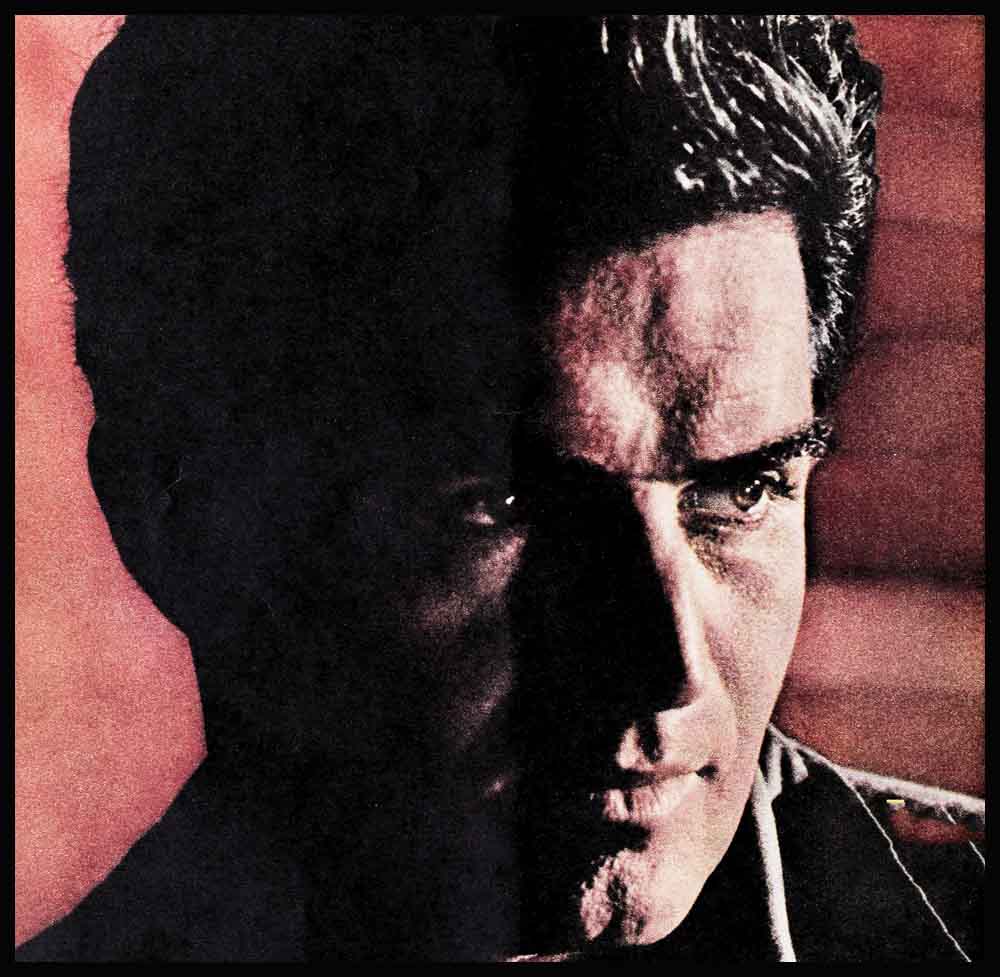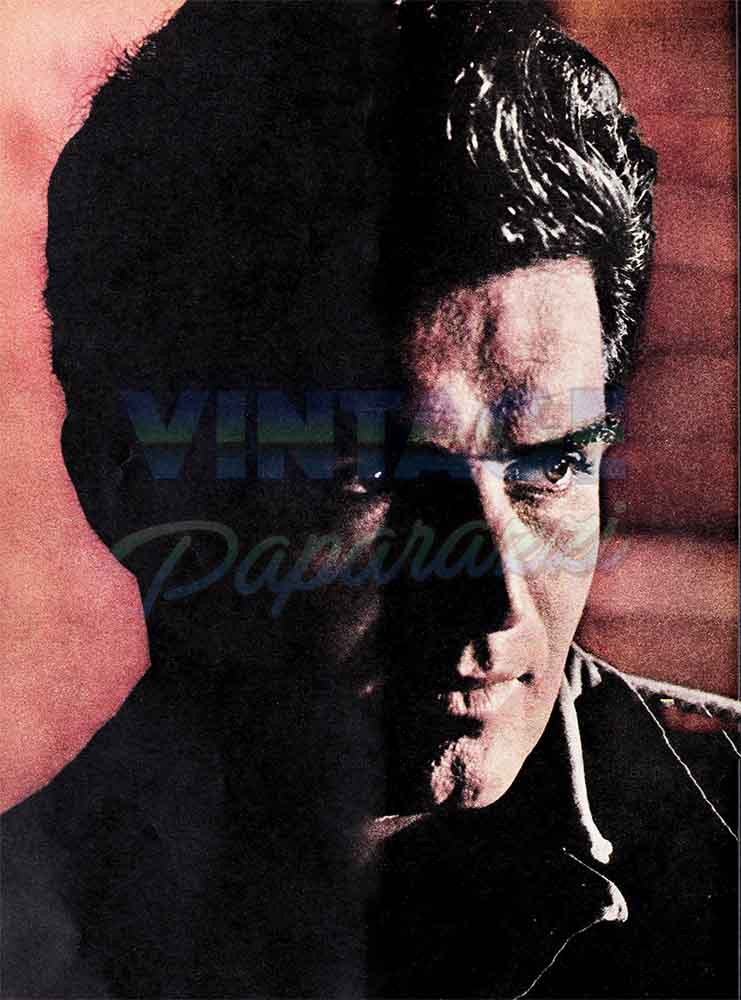
The Man Vince Edwards Can’t Stop Punishing
And self-pity. He wastes emotional energy in dredging up bitter childhood memories, in recounting his fight to make a dollar, in denouncing Hollywood for ignoring him for so many years when success came to others so sqeet and easy.
You can show him a hundred stars who made it the same way he did, who climbed the ladder rung by painful rung, but he still wants to know why Hollywood had to make it so hard for him—Vince Edwards.
“He’s a funny guy,” says one of his friends—of whom, incidentally, there are many in spite of his grim approach to life. “He’s never happy unless he’s complaining. It’s time to forget how tough it used to be—it’s good now and that’s all that counts. But Vince can’t forget. He broods.”
He sat there, thinking of Vince brooding about his poverty-stricken childhood among the Brooklyn tenements. And how Vince said. “I remember black fire escapes running across dirty gray buildings.” And. “All the women seemed to have been born gray, and the men were never young.” And how he, Vince, had rickets from malnutrition. But he recovered and grew up a hefty kid after all. An athlete, even.
Itsn’t money everything?
“Why can’t he be happy?” his friend burst out. “Most people want to be happy—but Vince keeps hitting himself over the head with what’s past and buried. What a pity, what a waste of sweet success! If ever a man should be bubbling with joy, he’s the man.”
There’s no doubt that Vince Edwards has plenty to be happy about, if he’d let himself go. He’s making big money. He has all the fame and adulation he dreamed of when he first came to Hollywood and got nothing but a big pushing around. Things are certainly different now. Vince earns $5.000 a week for “Ben Casey” and that’s just the beginning. He gets 10 per cent of the show’s net profits. He makes personal appearances. There are all those juicy merchandising tie-ins that could happen only to a star whose personality has so fantastically captured the public imagination. There are deals whereby he’ll make TV films for his own Corporation. And above all, if he hadn’t hit it big as Dr. Ben Casey, who knows if he’d have been tapped for the star role in “The Victors”—fine actor though he is. Of course he was a fine actor before he became a TV doctor, but no one paid him $150.000 for one single picture, as the producers of “The Victors” did.
“But those are the facts of Hollywood life,” shrugged another friend of Vince’s. “When you’ve got it, they give you more. When you’re a star, they all want you. The tough part is making it to stardom. Vince finally made it and we’re all happy for him. Everybody’s happy—but Vince. He’s still sore because it came so hard.” He shrugged again. “I suppose eleven years of being practically ignored can bite deep into any man.”
Abner Greshler, Vince’s agent, makes a happy prediction for his star: At the rate Vince is going, within a few years he’ll have a million dollars “free and clear.” Then he can do anything he wants. He can retire before he’s thirty-five and live off his Capital. Or he can make only the pictures of his choosing. He can turn his back on the hard-working doctor who made him rich and never do another “Ben Casey” segment in his life. (As a matter of fact, Vince gives himself another three seasons as Ben Casey, and then he’s through practicing medicine. “I’m interested in maintaining my health and sanity,” he explains.)
So what’s his problem? A man in such a fortunate financial position should be happy and grateful. Can it be that money isn’t everything?
Said Vince’s friend, “I know, and all his pals know. he’s got a sly humor that’s delightful—when he’s in the right mood. Too bad he isn’t in the right mood oftener—he’s a great guy, actually. But most of the time he only shows a grim, surly face around the studio. A real Ben Casey face.’
“He’s a self-defeater,” says another chum—who may be hitting the nail on the head more precisely than anyone has yet. “You have to be a self-defeater to keep playing the horses as heavily as Vince does. And he courts danger. too—which is what worries his friends the most. He fools around with motorcycles and fast cars. Sometimes he drives like he’s testing his reflexes on hairpin turns. He water-skis recklessly. He’s got a real yen for physical danger. This business of lifting Weights—it’s very dangerous if you slip. Once his foot did slip and brought a 220- pound weight crashing down on his back. He was lucky that time—all it gave him was a chronic bad back. But he keeps doing it, and some day he won’t be so lucky. Then maybe he’ll be satisfied.
“Look,” the friend said intently, striving to make a point, “trouble doesn’t just happen, you know. There are people who go looking for it till they meet it head-on. Then they holler loud and long. That’s a self-defeater—and that’s what Vince is.”
He told how Vince nearly did himself out of the Ben Casey role because of a fascination for racing cars. When Abby Greshler wanted him to audition for the pilot film, he couldn’t find Vince anywhere. He finally hired a private detective to track him down. The detective traced Vince to a Malibu Beach track—cars, not horses— and finally found him there—under a sports car, tinkering with the motor for a friend. The detective hustled him over to James Moser, who was casting “Casey.” And the rest is history.
It is no secret that Vince is a heavy bettor at the horse tracks, and always was. Before his Dr. Casey days, this form of gambling kept him broke, and when he was short of cash he’d borrow. Frank Russell, a Hollywood businessman who is suing Vince for $400,000—claiming Vince kept him from issuing two old Vincent Edwards recordings on which Russell would have made a pile—says, “Vince is casual about money. He must think it’s a privilege to lend him money.”
But that’s only one side of the coin. On the other is a friend like Duke Maxwell, who recalls that he once lent Vince $200 which Vince not only paid back. but with it another $300 “for back interest.”
And there is the funny-but-sad story told by actor Don Peters about the time Vince and a bunch of jobless gym buddies drove from Hollywood to Las Vegas to try and make some quick money.
“Vince lost his last five dollars at the slot machines,” recalls Peters. “and asked me for my last two. But that was all I had. So we turned around and came home—in worse shape than when we started.” They were able to buy gas for the car only because they all went without food on the trip back.
Now that Vince has more money than he needs, has he stopped gambling? Of course not. It just means he has that much more to put on a nag’s nose. So obviously it isn’t the need for money that sends him to the parimutuel windows. He’d have more money if he kept away—everyone knows that in the long run you can’t beat the horses. Even gamblers know it.
What’s more, Vince is sensitive about being thought of as a big gambler. He worries about what his fans will think of him. He knows he’s accepted as a strong, benevolent figure and he doesn’t want this image tarnished in any way. So lately, when he sees photographers trying to snap him at the track, he chases them off. And this doesn’t help matters either. It’s a vicious circle. Nevertheless, he doesn’t stay away—which would solve everything. He goes to the track and he keeps playing the horses. And he keeps worrying. Nothing is solved. As his friend said—he’s a self- defeater!
Dr. David Goodman, in his syndicated column once wrote, “The compulsive gambler is the world’s worst lover. He prefers placing a bet on a horse, any time. If the world’s most beautiful woman crossed his path at the race track and offered herself to him. he would say, ‘I can’t leave now; it’s only the third race.’ ”
Exaggerated? Perhaps. But girls do shy away from a gambler because they suspect he isn’t good husband material—he’s in love with Lady Luck rather than with a real girl. Beautiful Diane McBain dated Vince and liked him—until he asked her to drive down to Baja California with him for the races. At that point she balked. Later she told an interviewer, “It’s Vince’s passion for racing that. Em quite sure, has prevented me from taking to him.”
The attitude Diane McBain had is not an uncommon one among girls who really understand the psychology of the gambler.
Vince’s steady girl, Sherry Nelson, apparently doesn’t mind his gambling, for she does go to the track with him. She once quipped, “I gave Vince a winner (at Santa Anita) and I haven’t been able to lose him since.” But only recently Sherry said, “I’m afraid to marry Vince. The thought of being his wife, the mother of his children, frightened her. She couldn’t stand the fans, the fishbowl existence, the tearing and clawing at her man because to the fans he’s not an ordinary human being he’s Dr. Ben Casey. Could Vince help Sherry over the obstacles his very succes has put in the way of their happiness’ Some of his friends doubt it. Others think he could do it if he’d only learn to relax and enjoy his new fame and fortune, in stead of being beset by inhibitions and fears of which he isn’t even conscious, but which manage to spoil his fun.
When “Ben Casey” caught on so big, in became evident very soon that Vince Edwards was the star, though Sam Jaffe had a more distinguished career as an actor. For a while, Vince cooperated with the studio; he was affable to visitors, talked quite freely in interviews. Then he began to tire, and the bitterness came through. He began to complain about the long hours, the tension of memorizing so man lines, the pressures of having to grant so many interviews and pose for so many pictures. He enjoyed his publicity, there was no doubt about that, and he read every line written about him, but he became—and still becomes—infuriated when misquoted.
He still permits the studio to make publicity appointments for him, but he either avoids giving a forthright interview or else he keeps the interviewer waiting long, long time—or both. Then, when the stories are unflattering, Vince exclaims “See? What’s the use of giving interview when this is the stuff they write about me!” What he can’t see is that he provoked people until they can’t possibly be nice to him, and when they hit back at him, he feels justified in being bitter and angry. As one friend put it, “Vince is an injustice collector. He wants to feel put-upon.
He is also very demanding of his business associates, though in all fairness it nould be said that many of his demands are for the benefit of his buddies, not himself. Jobs, for instance. He put his pal Jennie Goldberg on the show as an extra, and his gym buddy Ray Joyer as his stand. He wangled a hard-to-get studio parking space for his girl Sherry. He de- landed, and got, an air-conditioned dressing room right on the set, plus two private hones and a desk for Goldberg, who doules as his secretary. He also started ariving late, displaying temperament and showing up at times without knowing his ones.
By demanding these star-status symbols, Vince is lashing out at the world in anger for having been rejected so many years. When his demands are met, hes reassuring himself that he’s a Somebody. Every time e has to be satisfied and soothed, he feels loved and wanted. Not exactly a grownup’s way—but Vince’s. And when he surrounds himself with old buddies, while it’s true he’s being loyal and providing jobs for them, he’s also assuring himself of adulation, sympathy and protection from a hosle world. He’s suspicious of new faces on the set. “Who’s that?” he’ll immediately ask. His friends suspect that he suspects the new person may be a process server in disguise, or someone seeking to collect old ambling debts—the gamblers’ nightmare.
It is a quote. PHOTOPLAY MAGAZINE FEBRUARY 1963






